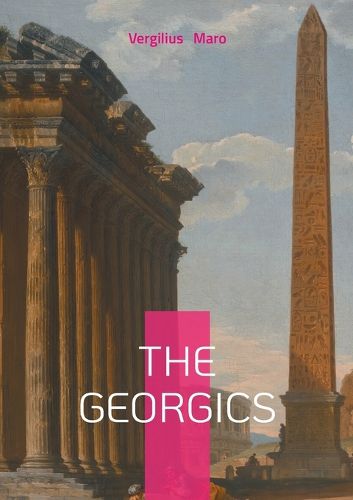Readings Newsletter
Become a Readings Member to make your shopping experience even easier.
Sign in or sign up for free!
You’re not far away from qualifying for FREE standard shipping within Australia
You’ve qualified for FREE standard shipping within Australia
The cart is loading…






This title is printed to order. This book may have been self-published. If so, we cannot guarantee the quality of the content. In the main most books will have gone through the editing process however some may not. We therefore suggest that you be aware of this before ordering this book. If in doubt check either the author or publisher’s details as we are unable to accept any returns unless they are faulty. Please contact us if you have any questions.
The Georgics by Virgil is a masterwork of didactic poetry that celebrates the rhythms of rural life and the art of agriculture in ancient Rome. Composed in four books, this epic poem blends practical farming advice with lyrical reflections on nature, the seasons, and the relationship between humans and the land. Virgil, renowned for his poetic skill and deep appreciation of the countryside, guides the reader through the cultivation of crops, the care of livestock, the management of vineyards, and the mysteries of beekeeping. Each book of The Georgics is dedicated to a different aspect of agriculture, offering detailed instructions alongside vivid descriptions of the natural world. The poem is both a manual for farmers and a meditation on the beauty and challenges of rural existence. Virgil weaves together myth, history, and philosophy, creating a tapestry that honors the labor of the farmer while exploring broader themes of order, harmony, and the cycles of life. Beyond its practical content, The Georgics is celebrated for its rich imagery, musical language, and profound insights into the human condition. Virgil's portrayal of rural life is infused with a sense of reverence for nature and a recognition of the hardships faced by those who work the land. The poem stands as a cornerstone of Roman literature and classical poetry, inspiring readers and writers for centuries with its blend of technical knowledge and poetic beauty.
$9.00 standard shipping within Australia
FREE standard shipping within Australia for orders over $100.00
Express & International shipping calculated at checkout
This title is printed to order. This book may have been self-published. If so, we cannot guarantee the quality of the content. In the main most books will have gone through the editing process however some may not. We therefore suggest that you be aware of this before ordering this book. If in doubt check either the author or publisher’s details as we are unable to accept any returns unless they are faulty. Please contact us if you have any questions.
The Georgics by Virgil is a masterwork of didactic poetry that celebrates the rhythms of rural life and the art of agriculture in ancient Rome. Composed in four books, this epic poem blends practical farming advice with lyrical reflections on nature, the seasons, and the relationship between humans and the land. Virgil, renowned for his poetic skill and deep appreciation of the countryside, guides the reader through the cultivation of crops, the care of livestock, the management of vineyards, and the mysteries of beekeeping. Each book of The Georgics is dedicated to a different aspect of agriculture, offering detailed instructions alongside vivid descriptions of the natural world. The poem is both a manual for farmers and a meditation on the beauty and challenges of rural existence. Virgil weaves together myth, history, and philosophy, creating a tapestry that honors the labor of the farmer while exploring broader themes of order, harmony, and the cycles of life. Beyond its practical content, The Georgics is celebrated for its rich imagery, musical language, and profound insights into the human condition. Virgil's portrayal of rural life is infused with a sense of reverence for nature and a recognition of the hardships faced by those who work the land. The poem stands as a cornerstone of Roman literature and classical poetry, inspiring readers and writers for centuries with its blend of technical knowledge and poetic beauty.